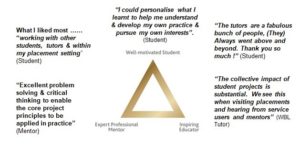Developing Innovative ‘Extended’ Communities of Practice (CoP) which Enable Students to Produce Inspiring Projects in their Practice Settings
By Lisa Porter, Lisa Mauro-Bracken, Dawn Goodall and Rebecca Weston, School of Allied Health and Community

The Work-Based Learning (WBL) level 5 module is premised on students ‘giving back’ to the wider community though the development and implementation of successful projects in their practice settings (A5), to bring about practice improvements which benefit staff and service users (K3; V4). This reflects the values of the University of Worcester’s Strategic Plan (2019) to positively impact the world around us and enhance our relationships with the local community (V4). Through experiential learning (Scott, 2015), (V3; A5) students also develop project leadership skills enhancing their graduate employability.
To create a successful WBL environment, students, mentors and the University must form a three-way partnership (ASET, 2013), reflecting the University of Worcester’s ‘Golden Triangle of Professional Education’ (2019). Within the WBL module, each element of the ‘Golden Triangle’ brings and shares their experience, knowledge, insight, resources and support for the student projects (‘practice’), learning from each other and building relationships (‘community’). This is for the shared purpose of supporting the development and implementation of the student projects in the workplace (‘domain’) (A4; K2; V4). The combination of ‘domain’, ‘community’ and ‘practice’ evolved in parallel and fostered the essential elements of a CoP (Wenger- Trayner and Wenger-Trayner 2015). However, within the WBL Module the Communities of Practice has been extended beyond these three elements to include other stakeholder perspectives. Involvement of the Universities ‘Experts by Experience’ service user and carer group enhanced students’ awareness of the wider context within which their projects sat (A4; V4). Class groupwork stimulated peer feedback and discussions on the projects. Teaching facilitated students to discuss and involve other placement staff within their projects and gain their colleagues feedback. This extended CoP built effective and supportive relationships with student’s peers (other university students in class as well as practice colleagues), families and informal carers as well as service users, traditionally lacking in ‘voice’. The team have fostered and become a crucial element of a rich extended CoP which supports and facilitates students to deliver their projects in practice.
Feedback from module evaluations and student workbooks demonstrated a highly effective CoP and, could be applied to the ‘Golden Triangle’. Mentors recognised the students developing skills and commended the positive impact the projects had in their settings; students demonstrated motivation and recognised the support of university staff team. Feedback also evidenced strong relationships with service users, practice colleagues and student peers which indicated the CoP had extended beyond that of the traditional model, for example “my project allowed me to build strong rapport and build a partnership with service users” (Student, 2019).
The impact has been recognition by staff, students and mentors of the extended CoP embedded within the WBL module that transcends boundaries and includes those traditionally lacking a voice. Staff have further stimulated the ECoP by raising student’s awareness and guiding them on how to foster and harness their extended CoP into their projects. These combined factors motivated the team in our own practice as they align with our values around respect, student-centredness and inclusivity (V1; V2).
References:
ASET (2013) ASET Good Practice Guide for Work based and Placement Learning in Higher Education. Accessed 26th July 2019. Available at: https://www.asetonline.org/wp-content/uploads/2017/09/ASET-Good-Practice-Guide- eWBPL.pdf.
Scott, I. (2015) Innovative pedagogies series: Innovations in work-based learning. Accessed 26th July 2019. Available at: https://www.heacademy.ac.uk/system/files/ian_scott_final.pdf.
University of Worcester (2019) Strategic Plan Values and Vision Inspired for Life. Accessed 25th July 2019. Available at: https://www.worcester.ac.uk/documents/university-worcester-strategic-plan-2019.pdf.
Wenger-Trayner, B. and Wenger-Trayner, E. (2015) Introduction to Communities of Practice. Accessed 25th July 2019. Available at: https://wenger- trayner.com/introduction-to-communities-of-practice/.
Lead Authors:
Lisa Porter (Senior Lecturer and Admissions Tutor) Rebecca Weston (Senior Lecturer) (vignette adapted by).
Lisa Mauro-Bracken (Senior Lecturer and Head of Department, Health and Well-being) Dawn Goodall (LandT Co-ordinator and Senior Lecturer)
Team Members/Contributors:
Jo Augustus (Course Leader – Mental Health, Quality Lead) Jennifer Hill (Course Leader – Health and Social Care) Denise Levermore (Course Leader – CAMH)
Jo Lewis (Senior Lecturer) Jason Vickers (Senior Lecturer) Maddie Burton (Senior Lecturer)
Kirsty Fraser (Work Based Learning Tutor)
